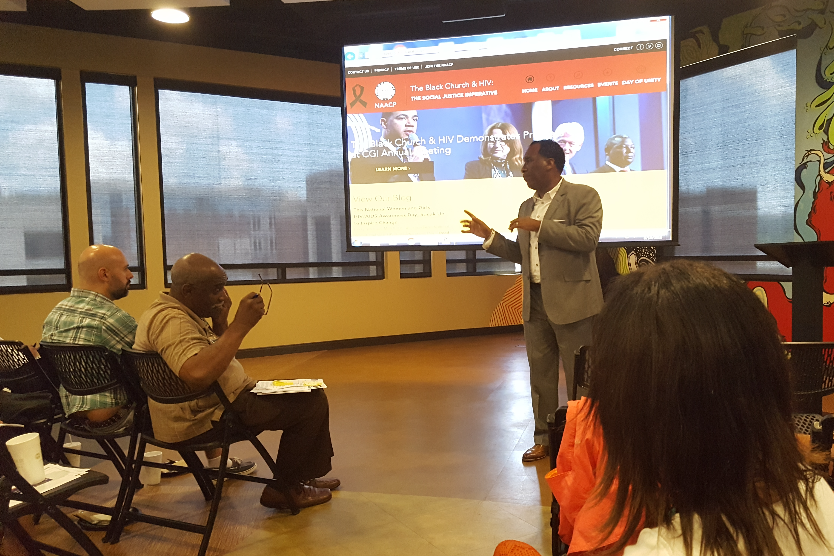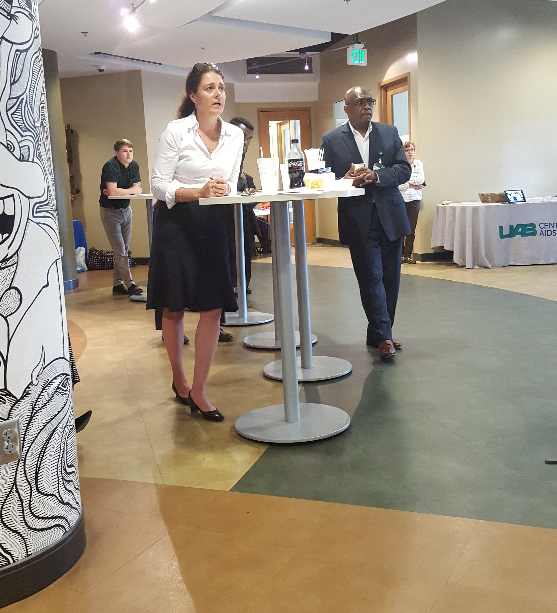
By Ebone’ Parks
The Birmingham Times

Members of the black church and the University of Alabama at Birmingham (UAB) met this week to discuss ways to address the HIV epidemic.
The Faith Leader Town Hall meeting combined The Black Church & HIV: The Social Justice Imperative with the UAB Center for AIDS Research (CFAR): Behavioral and Community Science Core. The goal was to connect the faith based community to address HIV and health disparities of the community.
“Whatever faith you are a part of, we are called to be sensitive to be compassionate,” said Rev. Keron Sadler, National Health Manager for the NAACP. “We’re missing a mark, we’ve got to learn how to be like Jesus and he loved people in spite of and not because of.”
The Black Church & HIV aims to train pastors on HIV as a social justice issue; secure formal resolutions from denominational leadership; and integrate HIV-focused coursework into required seminary curricula.
According to the Alabama Department of Health, in 2012 more than 4.8 million people were living in Alabama, 26 percent of whom were African American, accounting for more than two-thirds (63 percent) of those living with HIV in the state.
Several community and faith leaders spoke to discuss the issues that beyond doubt occur in the community and in the church.

Moderator Rev. William Francis is a part of The Black Church and a HIV Initiative Ambassador. He spoke about how he was denied by the church when they found out that he was HIV positive.
“We can talk theology all day if that’s what you want to do, but you will lose. It’s not about theology, it’s not about sexuality, it’s about humanity…if you are not willing to save a life, you are not willing to save a soul,” Francis said.
Francis also discussed that through a “social justice mindset, is to have a kingdom mindset.”
Dr. Marjorie Innocent, Senior Director, NAACP Health Department, said the church has been a safe in the past for social issues.
“The impact, the influence, the passion, the commitment of faith leaders in addressing HIV is going to be very core to us being able to address it and eliminate not just the disparities, but the new cases of the disease,” she said.
Edward Jackson, Community Engagement Coordinator for UAB Behavioral and Community Sciences Core, said, “The goal (of the Town Hall meeting) was to bring faith base and key community leaders into a setting so we can have the dialogue so we can engage and remove health disparities, to develop research, methods and other cohorts.”
Robin Lanzi, Co-Director at CFAR Behavioral and Community Science Core, said she was pleased with the spiritual aspect of the meeting. “I feel that we were all very blessed by it; it was an amazing uplifting time for all of us to reflex on what we can do, what we are doing and ways to continue to build and partner together.”
Head, Heart and Feet was the general message for those in attendance: Using your head for knowledge, you heart to have a will to serve and your feet to actually act on the HIV epidemic.
A number of ideas were suggested at the end of the meeting.
“A lot of attention is brought to people who are infected by HIV, and equal attention has to be given by people who are affected by HIV; the opportunity for us to have more people participating in HIV research is great as long as we’re able to get that information out there,” said Tommy Williams, who works in research at UAB Alabama Vaccine Clinic.
A few church leaders also volunteered their church to be involved to help deal with the HIV epidemic.
“What needs to happen is a sensitivity training because people don’t know a lot about what’s going on,” said Pastor Wayne Taft Harris Jr. of Horizons; The Place, “if we get past the theology and look at humanity, I think things would be different.”




